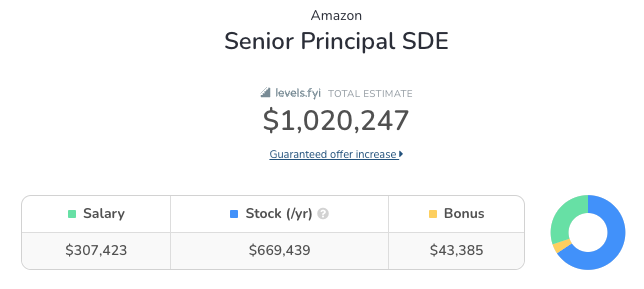Why Software Developers Can't Afford to Ignore Finance
In this blog post, we'll explore the myriad of reasons why software developers should venture into the world of finance and how this knowledge can unlock new opportunities, enhance impact, and lead to more informed career decisions.

As a software developer in today's rapidly evolving landscape, understanding the nuances of finance is not just a value-add; it’s becoming a necessity. In this blog post, we'll explore the myriad of reasons why software developers should venture into the world of finance and how this knowledge can unlock new opportunities, enhance impact, and lead to more informed career decisions.
Career Decisions
Most software developer job offers contain a good portion of equity, which can be the most complicated part to understand. According to the data from Levels.fyi, the new grad position for big tech companies receives equity as a 15% total compensation on average, and the percentage significantly grows for more senior roles up to 65%.

So, understanding the granted equity portion is critical when weighing different enticing job offers. Diving deep into equity deserves an entire series of posts, but here are a few things to be considered:
- What's the vesting schedule? What's vesting to begin with?
- How does the vesting work? Based on dollar amount or number of shares (or stock options)? Is the amount finalized when I sign the offer or start working? Does the amount stay the same throughout the vesting schedule at all?
- Is the company public or private?
- If the company is public, what type of equity is it? Preferred stock or common stock? Is there any string attached?
- If the company is private, what type of equity is it? Restricted Stock Unit (RSU) or Stock Option? What's the value of the equity, and how is it calculated?
- If it's RSUs, what are the restrictions?
- If it's Stock Options, what's the strike price? How's the strike price compared with the company valuation? Is it NSO or ISO? How does exercising before IPO work? What's the expiration date? What would happen if I left the company before the IPO? Has there been any internal buyback from the Board of Directors (BoD)?
- How does equity affect voting rights?
- How's the company doing? What are the odds that all the equity significantly decreases in value or turns into nothing?
These questions are not exhaustive, and answers to many of them can only be obtained once you accept the offer and start working for the company. Nevertheless, by keeping these questions in mind, you'd be able to understand the unknowns better, which assists in making the final decision.
To compete for talent, tech companies have several smaller programs, including 401(k)/RRSP matching and reimbursement programs. These programs might sound simple, but there are some tax implications to be aware of.
- What's 401(k) or RRSP?
- How much does the employer match? What's the ratio?
- What will the employer do with the money put into 401(k)/RRSP?
- When can I withdraw the money?
- What would happen if I left the company?
- What's the tax implication for the reimbursement programs?
Enhance Impact
At the end of the day, it all comes down to what impact a software developer has on the company. The level of impact at the company is the primary determinant of the seniority of a software developer. A solid financial knowledge foundation helps gain the business context and grasp the "why" of the work. With a firm grip on business matters, convincing stakeholders to execute a project one way or another becomes easier.
Imagine a genius engineer who spotted a scalability problem in the codebase and proposed that the engineering team pause feature work for six months to adopt a new code architecture. The approval of such a proposal is a must if the company wants to grow to the scale of Google, Microsoft, or Amazon. However, it is improbable that the plan went through without tangible financial numbers. If the genius engineer leads the project to success, the impact on the business is colossal. If the idea is rejected, no impact will be made. As a result, there will be no career advancement for the genius engineer and no innovation for the company.
Although the story sounds grand, it also applies to junior software developers who want to progress. Minor feature adjustments and effective prioritization that can achieve the same business goals with less time, less effort, and less tech debt are highly valuable to the company. These skills make up the difference between the replaceable ones who only do what they're told and the irreplaceable ones who know what they're doing.
Apart from aiding in progressing the career ladder, those skills also open up another lucrative career path for software developers - engineering managers.
New Opportunities
After gaining some insight and experience as a software developer at tech companies, you can switch things up by becoming an entrepreneur. In its swift evolution, the tech industry is significantly shaped by financial markets and venture capital. Budgeting, fundraising, cash flow management, and understanding the financial market dynamics are essential skills for running a successful startup.
If starting a business isn't your goal, but you still wish to make an impact in the industry, you can consider becoming an investor. With sufficient financial knowledge and yearslong technical experience, not only can investors help the startup become successful and reap the financial rewards, but they can also direct how the startup helps the world become a better place (hopefully).
In conclusion, acquiring financial acumen is a strategic move that goes beyond mere technical expertise, opening up a world of opportunities.
If you find the post helpful, please consider sharing & subscribing!
Disclaimer
The information in this post is for informational purposes only and is not intended to be personal financial advice.
Reference






